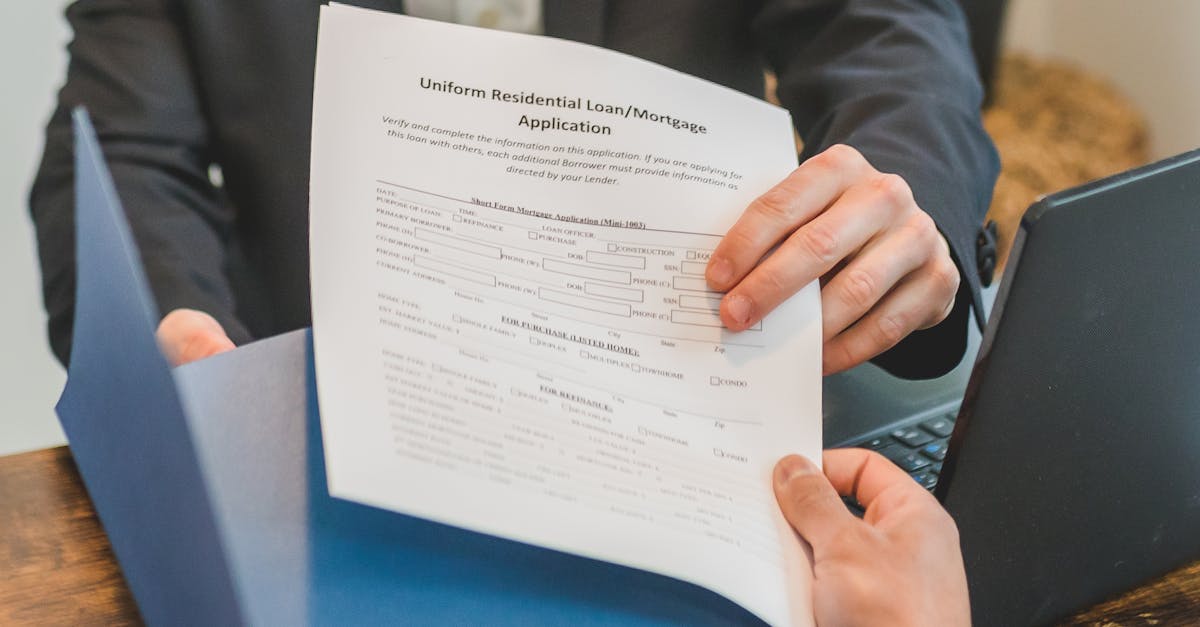
Table Of Contents
Preparing to Apply for a Multifamily Loan
When preparing to apply for a multifamily loan, it’s essential to gather all necessary documentation that lenders typically require. This includes financial statements, tax returns, and details about the properties in question. Understanding the specifics of Multi-Family Apartment Loans can help streamline the application process. Having organized records not only demonstrates professionalism but also reassures lenders about your commitment to the investment.
Additionally, potential borrowers should assess their financial health before submitting an application. Reviewing credit reports is crucial to identify issues that might affect the loan approval process. Knowing your credit score can provide insight into the types of Multi-Family Apartment Loans for which you qualify. A solid financial foundation will strengthen your application and may lead to better lending terms.
Steps to Improve Your Credit Score
Improving your credit score is a crucial step when preparing to apply for Multi-Family Apartment Loans. Start by reviewing your credit report for errors. Disputing inaccuracies can lead to a higher score, which makes you a more attractive borrower. Payment history holds significant weight in credit scoring, so ensuring bills are paid on time can have a positive impact. Reducing credit card balances also helps, as high utilization rates can negatively affect your score.
Another effective strategy involves diversifying your credit mix. If you're reliant on credit cards, consider taking out a small personal loan to show you can handle different types of credit responsibly. Avoid opening too many new accounts at once, as this can lead to hard inquiries that temporarily lower your score. Establishing a long credit history contributes positively, so keeping older accounts open is beneficial. Working on these aspects gradually enhances your credit profile and increases your chances of securing favorable terms for Multi-Family Apartment Loans.
Alternative Financing Options
For those struggling with a less-than-ideal credit score, various alternative financing options exist for securing a multifamily loan. Traditional banks may impose stricter requirements, leaving other avenues for borrowers to consider. Private lenders and non-bank financial institutions often provide flexibility in their terms. These sources might place more emphasis on property cash flow and potential rather than solely on the borrower’s credit score. Multi-Family Apartment Loans are often structured to accommodate investors in this regard.
Hard money loans are another option that can assist those with lower credit ratings. While these loans typically demand higher interest rates, they allow for a quicker acquisition process, especially beneficial in competitive markets. Investors should weigh the urgency of their purchasing goals against the cost of borrowing with hard money. Multi-Family Apartment Loans from these lenders can facilitate immediate investment opportunities, despite any credit rating concerns.
Options for Low Credit Score Borrowers
Borrowers with a low credit score may find it challenging to secure traditional financing, but options still exist. Certain lenders specialize in providing Multi-Family Apartment Loans that cater to individuals with less-than-perfect credit. These lenders may consider other factors such as rental income, property cash flow, or a higher down payment to mitigate the risks associated with lower credit scores.
Government programs also offer pathways for those seeking Multi-Family Apartment Loans despite credit challenges. The Federal Housing Administration (FHA) provides insurance on loans, potentially easing the qualification process for borrowers. Moreover, working with a knowledgeable mortgage broker can uncover unique financing solutions tailored to different financial situations, providing additional support in navigating the lending landscape.
Lenders and Their Requirements
Lenders have specific requirements when evaluating applications for multi-family apartment loans. They typically focus on key factors, including the applicant's creditworthiness, financial history, and the property's income potential. A strong credit score can significantly enhance your chances of securing favorable terms. However, even applicants with lower credit scores may still find opportunities for financing if they can demonstrate financial stability and a solid investment strategy.
Different lenders may prioritize various criteria when assessing a loan application. Some might place more emphasis on the debt service coverage ratio, while others could consider the overall market conditions and property management experience. Understanding these nuances is crucial for borrowers seeking multi-family apartment loans. By doing thorough research on potential lenders, applicants can better align their financial profiles with the requirements necessary for approval.
What Different Lenders Look For
When evaluating applicants for Multi-Family Apartment Loans, lenders typically assess several key factors that contribute to the overall financial profile of a borrower. A strong credit score is crucial, as it reflects the borrower’s creditworthiness and ability to manage debt responsibly. Additionally, lenders consider the borrower's debt-to-income ratio, which provides insight into their overall financial health and capacity to handle loan payments alongside other financial obligations.
Lenders also place significant emphasis on property management experience and real estate investment history. A borrower who has successfully managed similar properties in the past is often viewed more favorably. Furthermore, the potential cash flow generated by the property plays a vital role in the assessment process. Lenders want assurance that the property will generate enough income to cover loan repayments while maintaining ongoing operating expenses.
FAQS
What is the minimum credit score needed for a multifamily loan?
Generally, most lenders require a minimum credit score of around 620 to qualify for a multifamily loan. However, the exact requirement can vary depending on the lender and other factors.
How can I improve my credit score before applying for a multifamily loan?
To improve your credit score, you can pay down existing debts, make all payments on time, reduce credit card balances, avoid taking on new debt, and check your credit report for errors.
Are there financing options available for borrowers with low credit scores?
Yes, there are alternative financing options for borrowers with lower credit scores, such as FHA loans or private lenders who may have more flexible requirements.
What do lenders look for besides credit scores when evaluating a multifamily loan application?
In addition to credit scores, lenders typically evaluate your debt-to-income ratio, the property's cash flow, your experience with property management, and the overall condition of the property.
Can I get a multifamily loan with a credit score below 620?
While it's challenging, some lenders may consider applications with credit scores below 620, particularly if you have strong financials in other areas, such as income and asset reserves.





